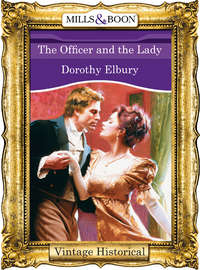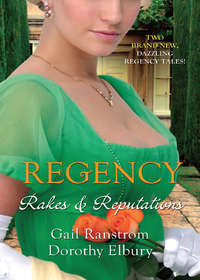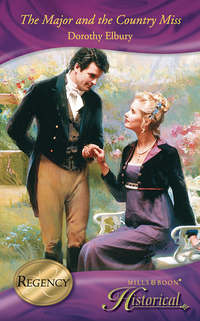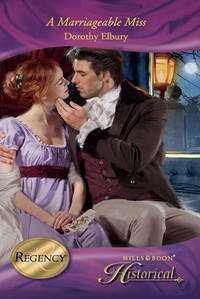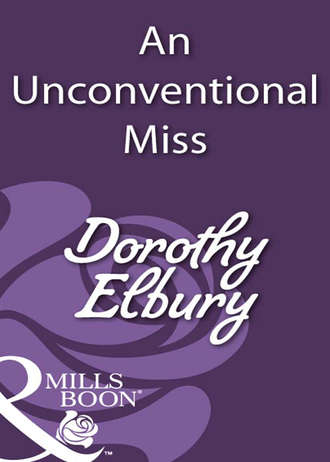
Полная версия
An Unconventional Miss
‘So it would seem,’ returned the new earl morosely. ‘And the very last thing I could have wanted, as you must know!’
Fitzallan gave a sympathetic nod, then, clearing his throat, asked, ‘When did you get back?’
‘Managed to get a passage last night—got into Tilbury early this morning. Had to leave Berridge and Taverner to collect up my things and bring the horses and carriage over as best they could—I hired a hack and rode straight to Brentford. Thought it best to get the full details from the solicitor before I saw my grandmother.’
‘If there’s anything I can do to help, old chap, I hope you know that you have only to ask!’
‘Point taken, Freddy,’ said Wyvern, forcing a smile. ‘But, unless you happen to have the odd thirty thousand going begging, it would appear that there’s not a lot that anyone can do!’
Fitzallan let out a low whistle. ‘Phew!’ he gasped ‘As bad as that! I had heard the rumours, of course—difficult to avoid them, as you know—but I hadn’t realised…’
He was silent for a moment, then, somewhat apologetically, went on, ‘’Fraid my pockets are to let, as usual. Had to borrow a score from Holt, only yesterday. Maybe he can help—pretty well loaded, dear old Simon, as you know!’
Shaking his head, Wyvern replied, ‘I was joking, dear boy—wouldn’t dream of asking either one of you. Apart from which, there would be little point, since I don’t have the means to pay back a loan of that magnitude.’
Then, as briefly as possible, he outlined the bones of his earlier meeting with the family solicitor, carefully skating over the less savoury aspects of his deceased older sibling’s downfall.
From the limited information that he had managed to cull from Humphreys, who had been the Ashcroft family’s solicitor for a good many years, Wyvern had endeavoured to piece together something of his late brother’s final days.
It appeared that, during the two years following the carriage accident in which his young wife and baby son had both lost their lives, the late Lord Wyvern had done his best to drown his sorrows in drink. Unfortunately, to the eventual detriment of Ashcroft Grange, the Wyverns’ family seat in Middlesex, he had also spent a great many of his waking hours frittering away large sums of money at the gaming tables of one or other of the many gambling dens in the capital. Insofar as his younger brother had been able to establish, it would appear that not one person amongst the late earl’s recently acquired circle of friends had felt himself either inclined or able to curtail Theo’s reckless proclivities.
To make matters worse—if that were at all possible—Humphreys had then discovered that the late earl, having gambled away the bulk of his own not inconsiderable fortune, had begun to make significant inroads into the estate’s ancient assets. In order to fund his spiralling obsession, he had systematically sold off a good many of the cherished silverware collections, along with a quantity of highly prized paintings, irreplaceable tapestries and other such items of value.
Barely able to meet the look of disbelief in his client’s eyes, Humphreys had been obliged to steel himself in order to continue his recital of the sorry catalogue of the late earl’s excesses, the sad truth of the matter being that, had it not been for the dedication of the small handful of staff who had stayed loyal to their rapidly declining young master, the once carefully husbanded and prosperous estate might well have run to seed. In addition to which, he revealed that Theodore had penned a list containing the names of his creditors, who were collectively owed an amount in excess of thirty thousand pounds—twenty-five thousand of which was in unpaid gambling debts!
As the enormity of his beloved brother’s fall from grace had gradually began to force its way into Wyvern’s shocked sensibilities, the reasons for Theo finally having elected to put a period to his life had become all too clear to his reluctant successor.
Nevertheless, as he now pointed out to Fitzallan, who had digested his friend’s halting narration in a frowning silence, the question still remained as to how the devil he might set about salvaging the situation?
‘If what your man says is correct,’ observed Fitzallan, carefully inching his way through the congestion of traffic on Grosvenor Street, ‘it would seem that you have very little option left but to sell up and take what you can get out of the deal.’
‘Oh, not you as well!’ exclaimed Wyvern, affronted at his friend’s casual dismissal of the estate that had been in the family’s possession for nigh on eight generations. ‘That was Humphreys’s advice too, but the whole idea is unthinkable! I would sooner die!’ But then, as the awful significance of these melodramatic words hit him, he let out a hollow laugh and added, ‘I trust it won’t come to that, of course!’
‘Steady on, Ben, old thing!’ protested Fitzallan. ‘We have not quite reached point-non-plus. If we all put our heads together, we may yet come up with a solution. You might even find that her ladyship has the odd idea or two up her sleeve—she always used to keep her ear pretty close to the ground, as I recall.’
Wyvern attempted a grin. ‘From what Humphreys tells me, Grandmama would seem to be as mettlesome as ever—still haring around the countryside as though she were no more than twenty-five!’
‘Must be close to eighty now, I imagine?’
‘Admits to sixty, I believe,’ returned Wyvern, as Fitzallan’s curricle swung into Grosvenor Square. ‘You will come in and say “hello”, of course—she always had a soft spot for you.’
Pulling out his timepiece, Fitzallan looked down and shook his head ruefully. ‘Some other time, if you will excuse me. Arranged to meet Holt at Brooks’s—half an hour late already. P’raps you’ll get the chance to look in on us later this evening?’
Promising that he would see what he could do, Wyvern leapt down from his perch, saluted his friend and mounted the shallow steps up to the front door of the family’s Grosvenor Square residence, to which he shortly found himself admitted by his grandmother’s elderly retainer.
‘Good to see you back safely, your lordship,’ beamed Jesmond, as he ushered Wyvern into the hall and signalled to a waiting footman to relieve him of his outdoor garments. ‘Your luggage arrived this morning. Her ladyship has been expecting you hourly. You will find her in the red salon.’
Still unable to prevent the recoil of distaste that he felt at hearing himself addressed by what had been, until a mere two months previously, his older brother Theodore’s title, the new earl strode across the hall to greet his grandmother, who was presently emerging from the doorway of the aforementioned salon.
‘Benedict! My dearest boy—you have arrived at last!’
A tall, white-haired lady, now in her eighty-first year, Lady Lavinia Ashcroft, Dowager Countess of Wyvern, moved gracefully towards her grandson, exhibiting considerable agility for one of her advanced years. Unlike a good many of her peers, she disdained the prevailing fashion for the semi-transparent muslin afternoon dress and was elegantly clad in a simple but expertly cut round gown of black kerseymere, trimmed at the neck with a neat white ruff.
After kissing Wyvern soundly on both cheeks, she held him at arm’s length, carefully scrutinising his ruggedly handsome face.
‘You look tired, my boy. I shall have Mrs Winters prepare you a bath—but first, you must join me in a glass of brandy. Jesmond!’
Taking his arm, she allowed her grandson to escort her back into the red salon, so named because of the crimson silk wall hangings and curtains with which it had been furnished many years earlier. Smaller than any of the other reception rooms in the house, it was the Dowager Countess’s favourite place to sit in the afternoons, due mainly to the fact that its window overlooked the busy London square, providing her with not only ample advance warning of any impending visitor but, perhaps more significantly, enabling her to keep her eye on her neighbours’ comings and goings.
‘You have seen Humphreys?’ she enquired, as soon as Wyvern had taken his seat and Jesmond had left the room.
Wyvern nodded. ‘I went to Brentford first thing, as soon as we docked. But it is just as you said in your letter—Theo does appear to have taken his own life.’
‘Humphreys gave me to understand that your brother had left a letter for you. I trust that it contains some sort of explanation for his extraordinary behaviour of late?’
Extracting his brother’s missive from his pocket, Wyvern passed it to her. ‘Nothing of any consequence, I fear—apart from his apology. He was clearly very confused when he wrote it.’
Leaning back wearily, he ran his fingers through his crisp dark hair, mentally reviewing the singularly odd tenor of his brother’s last words.
Ben, old chap, the note read, Can’t go on—got myself into an unholy mess—can’t seem to sort it out—mine is yours now—too late for me. Save the Grange, I beg you—relying on you—remember where we used to play when we were lads—forgive me, Theo.
His forehead puckered in a frown. ‘I am still finding the whole affair almost impossible to comprehend. I was aware that Theo was pretty cut up after losing Sophia and young Edwin, of course, but I had no idea that he was in such a bad case. A fellow officer did hear a rumour that he was drinking heavily, but to learn that he has frittered away the entire family fortune on gambling and profligate living is unbelievable—especially when you consider that he was the one Father was wont to call “old sobersides”!’
Save for the sonorous ticking of the long-case clock in one corner, the red salon was silent until, suddenly conscious that his grandmother was waiting for him to continue, Wyvern, striving to keep his innermost feelings under control, took a deep breath.
‘Nevertheless,’ he managed eventually, ‘it is to his credit that Theo seems to have stopped drinking long enough to recover his senses. But he was clearly not himself when he wrote that note—if everything is as bad as Humphreys has given me to understand, how could Theo possibly have expected me to put it all right?’
‘I trust that you do not intend to fall into an emotional stew over this, my boy!’ retorted the countess, eyeing her grandson sharply. ‘Your brother proved himself to be a weakling and, in the end, it appears that he took the coward’s way out, so let us have no more repining over the matter!’
‘Hold hard, Grandmama!’ protested Wyvern, altogether taken aback at the countess’s apparent lack of sympathy towards his late brother. ‘You can hardly expect me to agree with your view that Theo was a weakling. Any man might turn to drink after such a tragedy, especially if he holds himself responsible for the death of his family, as Theo clearly must have done—he was driving the carriage, after all! His suffering must have been very great—’
‘Pish and tush!’ interrupted his grandmother dismissively. ‘He is not the first person in the world to have been bereaved and left to get on with life—nor will he be the last! I would remind you, young man, that I myself was left a widow at no more than twenty-two when your grandfather was tossed from his horse and broke his neck. Did I fall into a decline and take to drink, I ask you?’
Since this was clearly a rhetorical question, Wyvern shook his head and did not reply, knowing from past experience that to interrupt his grandmother when she was in full flood was a pointless exercise.
‘No, I did not!’ she went on. ‘With an estate to run—as well as two young children to raise—I put aside my grief and tears, buckled down and got on with it, so please do not whimper to me about suffering. It is bad enough that your brother gave in to his demons, but to leave you to deal with the problems that he had created and then decided that he could not cope with, is simply the outside of enough!’
At her grandson’s continued silence, she tossed back the remains of her drink and gave a dismissive shrug. ‘Well, I have said my piece—you may get up and leave in a huff if you choose but, if you are the man that I take you for, you will pour us both another brandy and let us get down to the business of discussing how we may set about undoing the damage caused by Theodore’s lack of self-discipline!’
Loath as he was to agree with his grandmother’s harsh observations regarding his much-loved brother, Wyvern had to admit that she did, perhaps, have something of a point and if, in fact, the very perceptive old lady could come up with any useful ideas concerning the rescuing of Ashcroft Grange from its creditors, it would certainly be unwise of him to lock horns with her at this juncture.
‘I take it that we have no wealthy relatives of whose existence I have been previously unaware?’ he asked, as he refilled her glass and handed it to her, retrieving at the same time his brother’s note, which the countess had carelessly tossed on to the drum table beside her seat.
‘Sadly, no.’ She chuckled, relieved to see that she had not dented his good humour. ‘If your Aunt Fiona’s begging letters are anything to go by, her Irish earl has even less than we have! No, dear boy, it seems to me that what we could really do with at the moment is a rich heiress on the lookout for a peerage!’
Wyvern stiffened. ‘I had always supposed that I might have some little say in the matter of choosing a bride,’ he demurred.
She peered at him suspiciously. ‘You are not already promised, I trust?’
Regretfully setting aside the intrusive images regarding a certain little Parisian opera-dancer he had lately had in his keeping, Wyvern gave a short laugh.
‘No such thing, I assure you! However, to return to the point, I am inclined to think it that it is fairly unlikely that even the most pushing of mothers would be willing to marry her daughter off to an absolute “down-and-out”—belted earl or no!’
‘Nonsense, Benedict!’ chided his grandmother. ‘The Ashcroft name must still count for something in this country.’
‘Not if what Humphreys has told me is anything to go by,’ returned Wyvern bitterly.
‘How dare the man!’ exclaimed the countess, lifting her chin and drawing herself up to her full height. ‘What has he been saying?’
Wyvern shrugged. ‘Well, I certainly received the impression that the Ashcroft name alone no longer carries sufficient weight to get us any more credit with Coutts—Theo, apparently, having exhausted their goodwill! Fortunately, Humphreys has managed to persuade the partners not to press for immediate repayment. Unfortunately, there is still the matter of all the other creditors who, I have little doubt, will soon be baying at our door!’
Lady Lavinia sipped thoughtfully at her drink.
‘Then it is clear that we will need to make a push right away, my boy,’ she said, ‘before the upper echelons get wind of the full extent of your brother’s transgressions—they have been known to close ranks for far less serious demeanours!’
She paused, contemplating her grandson for a moment, then gave a decisive nod.
‘We must set about arranging a soirée!’
‘A soirée!’ replied Wyvern, considerably taken aback. ‘But we are in still in mourning!’
She shrugged. ‘We do not have the time to consider all the social niceties, my boy. I was not thinking of a huge affair—just a few close friends, perhaps—simply to announce our re-entry into society. As for suitable bride material, we could do worse than start with Eulalia Capstick—she has been out for a couple of years now and still no takers! Or, better still, what about Felicity Draycott?’
Wyvern choked on his drink. ‘Do I take it that you have already drawn up a list of suitable females?’ he demanded in astonishment.
‘Not as such,’ replied the countess, with a haughty sniff. ‘But I have always found that it does no harm to keep one’s ear to the ground.’
‘And might I be permitted to know the names of the rest of these illustrious females whom you have selected as suitable candidates for my hand?’ asked Wyvern warily. ‘If my memory serves me right, the dumpy Miss Capstick must have at least five Seasons under her belt. And, even though our family has been acquainted with the Draycotts since Felicity was in leading strings, having partnered the lady at dinner on more than one occasion in the past, I can assure you that she is totally without conversation!’
‘Hardly a matter of the greatest consequence!’ grunted Lady Lavinia, waving her hand dismissively. ‘The gal comes with a dowry of fifty thousand pounds, as well as being sole heir to her father’s estates—one of which, if you recall, borders the most westerly side of Ashcroft. It would be hard to hit upon a more satisfactory solution to our difficulties! In addition to which, rumour has it that she has been carrying the torch for you ever since you were at Cambridge!’
An expression of acute displeasure crossed Wyvern’s face. ‘If it’s all the same to you,’ he returned hurriedly, ‘I would just as soon not further my acquaintance with Miss Draycott.’
Shaking her head, the countess rapped him sharply on the wrist with her fan. ‘You are in no position to be overly particular, Benedict,’ she said sharply. ‘Gals who are both wealthy and comely tend to have their pick of the town’s beaux! And, unfortunately for us, the market appears to have conjured up very few pretty faces this Season—apart from the Beresford chit, of course, but she—’
Wyvern’s ears immediately pricked up. ‘Beresford?’ he asked, his eyes agleam with curiosity.
His grandmother shrugged an elegant shoulder. ‘Jessica Beresford, current Belle of all the Balls!’ she said carelessly. ‘A cit’s daughter, of course, but he was one of those nabobs who came back from India positively dripping in lard. I once met the man, Sir Matthew Beresford—dead now, so I’m informed—encroaching little nobody he was, especially after he got his knighthood! Married an Emily Herrington, then took her off to India, where she died giving birth to the gal’s half-brother—who, I understand, is also Matthew by name.’
‘Half-brother?’ frowned Wyvern who, having found his attention all at once diverted by the most vivid memory of a pair of flashing green eyes, was desperately trying to keep up with his grandparent’s mercurial change of direction.
Lady Lavinia nodded. ‘The present Mr Beresford,’ she told him. ‘Seems the father would have nothing to do with the boy—blamed him for his wife’s death or some such nonsense! Anyway, Sir Matthew married again, a Blanche Deveril—I am not familiar with the family—and that marriage produced a further two offspring. Then, last year, this Mr Beresford turned up and laid claim to his dead father’s estate, married his stepmother’s niece and is now the Jessica chit’s guardian!’
Pausing for breath, she cast an inquisitive glance in her grandson’s direction, but then, having registered the riveted expression on his face, shook her head.
‘Jessica Beresford is not for you, Benedict,’ she said decisively. ‘I am reliably informed that her half-brother has inherited the bulk of Sir Matthew’s estate. The girl is worth a mere five thousand a year and, whilst such a sum may be sufficient to have half the town’s swells beating a path to her front door, it is not nearly enough for our purpose!’
‘Calm yourself, Grandmama,’ returned Wyvern, with a wry grin. ‘I assure you that I have no intention of joining the ranks of those ramshackle bucks! I have already had the dubious pleasure of meeting the young lady in question and find myself singularly disinclined to pursue the acquaintance.’
But then, having recalled his odd action regarding Jessica’s handkerchief, he flushed slightly and, in order to redirect his grandmother’s attention, queried, ‘Who else do you have in mind for this grand scheme of yours?’
The countess’s brow furrowed. ‘Well, there are one or two other heiresses worthy of consideration, plus the usual smattering of rich widows, for instance—if you have no objection to an older woman?’
‘From where I’m standing,’ remarked Wyvern dryly, ‘even the two-headed, bearded lady from Astley’s Circus is beginning to sound quite plausible—provided that she has the necessary wherewithal, of course!’
‘Now you are just being ridiculous,’ sighed the dowager, then, glaring at her grandson, added, ‘Do you mean to try to save the Grange or don’t you?’
Wyvern ran his fingers distractedly through his crisp dark hair. ‘I mean to do my best,’ he replied stiffly. ‘There are other avenues I might explore.’
‘Such as?’
He shrugged. ‘I will need to return to Ashcroft and take a look for myself—assess the damage and so on. It is possible that things may not be quite as bad as Humphreys has led me to believe—he has always been something of a doom merchant, as I recall!’
‘Anything is possible, I suppose,’ retorted his grandmother. ‘Nevertheless, you must certainly go there as soon as possible—there are still several members of staff in residence. I dare say I might manage to rake up sufficient funds to pay them something of what they are owed.’
Wyvern froze. It had completely slipped his mind that the countess had already met the cost of his brother’s funeral and other sundry expenses while awaiting his return from Paris, where he had been serving with the Army of Occupation. For several minutes he studied her closed expression then, making up his mind, he said diffidently, ‘I suppose it would do no harm to pay a courtesy visit to the Draycotts—our families were on quite good terms at one time, as I recall.’
Her eyes softening, his grandmother looked across at him and gave a brisk nod. ‘That is exceedingly sensible of you, Benedict. Saving the estate is far more important than pandering to our own personal likes and dislikes—Ashcroft Grange has been in the family for over three hundred years. It was a hard struggle for me to keep it going sixty years ago and now it is your turn—you simply must not let it go without putting up some sort of a fight!’
Jumping to his feet and crossing the short space that separated them, Wyvern sat down beside his grandmother and grasped her hands.
‘I promise you that I will do whatever it takes, dearest one,’ he said, strengthening his resolve. ‘Miss Felicity Draycott will find me to be everything a girl has ever dreamed of, you have my word!’
Chapter Four
Owing to several pressing business engagements, Matt Beresford had been temporarily obliged to shelve the matter of discovering the identity of his siblings’ benefactor. He did, however, feel constrained to remonstrate with Lieutenant Stevenage when, three days later, that young man eventually returned to town.
On arriving at the Beresford residence, the lieutenant was shown straight away into the ground-floor study, where a stern-faced Beresford awaited him and, without further ceremony, confronted him with the series of disastrous events that had occurred following Jessica’s defiant exit from the inn at Turnham Green.
‘And now, sir, what have you to say for yourself?’ demanded Matt, fixing the lieutenant with his most severe frown.
Stevenage’s cheeks had grown pale with shock. ‘I really must crave your pardon, Mr Beresford,’ he stammered. ‘I begged her not to attempt the journey, but she…’
‘Has a mind of her own?’ supplied Matt who, being well acquainted with Jessica’s obstinate streak, was not entirely unsympathetic to the young man’s plight.
A vivid flush then covered Stevenage’s face but, squaring his shoulders and looking his host straight in the eye, he said, ‘Nevertheless, sir, I hold myself entirely responsible for what happened and give you my word that, should such a situation ever occur again, Miss Beresford’s welfare will be my primary concern.’
‘Along with your sister’s, I trust?’ interposed Beresford dryly.
‘Er—yes, but of course,’ came Stevenage’s hurried response. ‘Both ladies would be of equal concern, naturally!’
Matt’s lips began to twitch. ‘And how is Miss Stevenage?’ he asked, anxious to save the young man any further embarrassment. ‘I trust that she suffered no great hurt?’
‘Nothing of consequence, sir. I sent a message to my father and he came down with a carriage and took Olivia home—she is fine now, sir.’ The lieutenant paused, eyed Matt nervously then, taking a deep breath, went on, ‘I’m truly sorry about the landau, sir. I thought it best to remain at the inn until your coachman recovered, but then he refused to leave until the pole was fixed, which is why I have been out of town for so long—I would not care for you to think that I was fighting shy of facing you!’



